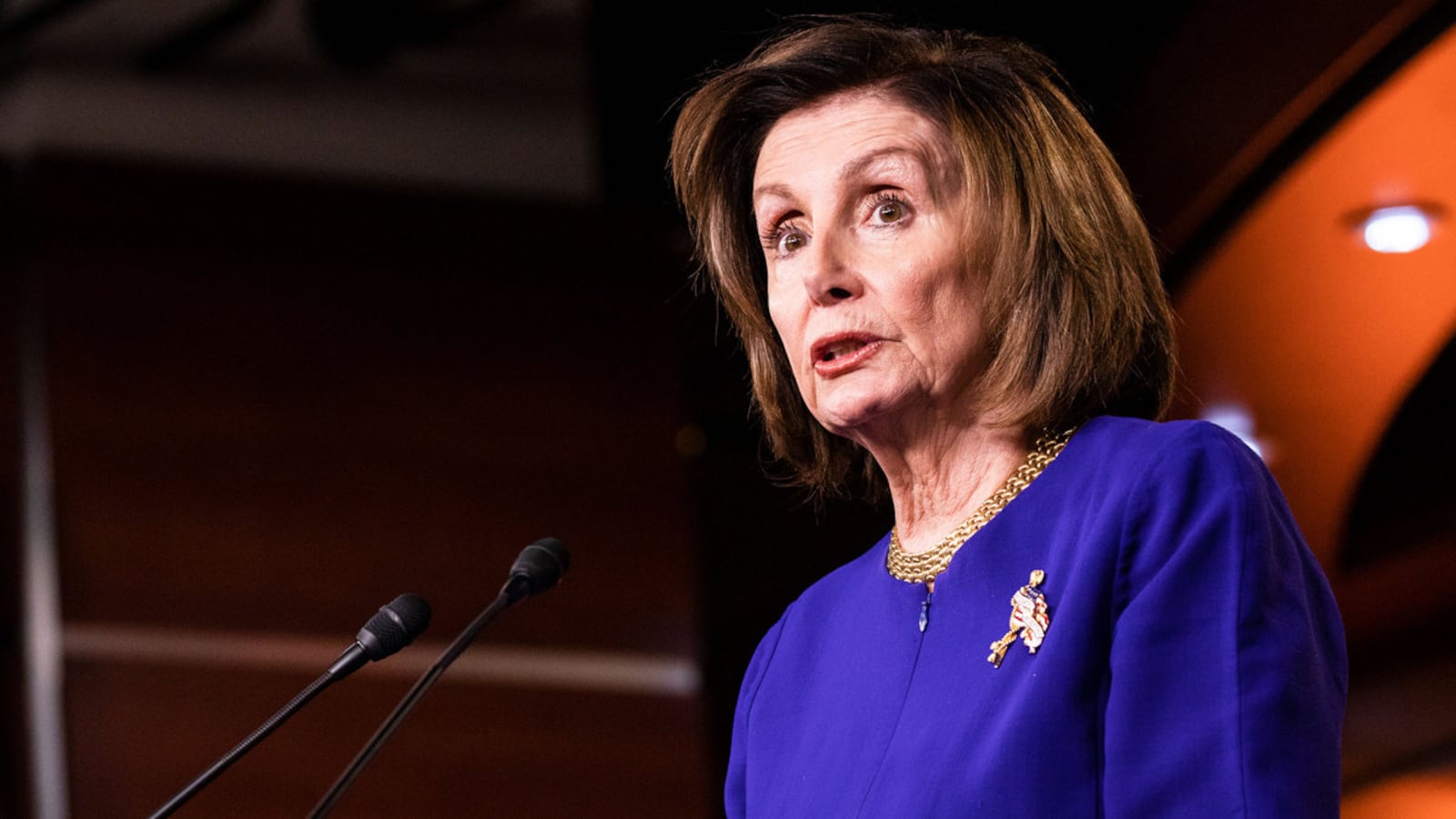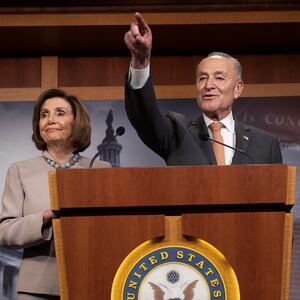For the second time in her career, Speaker Nancy Pelosi was tasked with bailing out a Republican president in a moment of national crisis and, with a tanking stock market in the background, came through with a bill.
Twelve years ago, Pelosi worked with President George W. Bush and his lieutenants to craft the 2008 emergency bank bailout. Late Friday night, she’d nailed down a deal with the Trump administration on legislation to respond to the spiraling coronavirus outbreak.
But unlike the first time—when the speaker and the man in the White House had a relatively decent working relationship—Pelosi this time was collaborating with a president who’d spent weeks trashing her as, among other things, “incompetent.”
The name-calling, ultimately, proved to be a minor hurdle, if one at all; as Trump was largely sidelined during negotiations. Over the course of Thursday and Friday, Pelosi spoke instead with Trump’s Secretary of the Treasury, Steven Mnuchin, nearly 30 separate times as they hammered out a deal.
Through it all, the speaker did not speak with the president once. Asked at a late-night Friday press conference if they had talked, Pelosi looked almost shocked that anyone might think so. “There was no need for that,” she said.
Bush was a participant in TARP discussions, though he strategically kept some distance as he and his aides felt that Treasury Secretary Hank Paulson would be more palatable a negotiating partner for lawmakers on the Hill. It was Paulson who famously leaned so heavily on Pelosi to help get the bank bailout through the House that he even got down on one knee to beg her to push the bill through her chamber.
The parallels between then and now aren’t perfect. But they aren’t far apart either. For lawmakers who were there during the autumn of 2008 the most important difference is the most obvious: Trump.
“The crisis atmosphere seems similar. The inability of the president to provide any real leadership is different,” said Rep. Lloyd Doggett (D-TX) shortly after a midnight vote on Saturday to approve the coronavirus legislation. “I disagreed vigorously with the Bush administration, but at least the president led and worked with his team on this. We're here at this hour, in large measure, because Donald Trump's provided no leadership, just obstruction.”
“I never thought I would say this,” said Rep. Zoe Lofgren (D-CA), who voted for the bailout at the time, “but Bush was capable of acting.”
While Trump made broad requests for the type of legislative response he wanted, he didn’t provide much in the way of specific details, so Democrats—led by Pelosi—simply plowed ahead. The first relief effort from Congress, a bill passed last week to inject $8 billion into the U.S. public health system, blew past the administration's initial ask of just over $2 billion—with the enthusiastic buy-in of Republicans in both the House and Senate.
The foundation of the deal passed on Saturday was laid out by congressional Democrats earlier in the week, who offered a list of legislative priorities to deal with the outbreak, including expanding paid sick leave, unemployment insurance, food assistance, and COVID-19 testing.
With Senate Majority Leader Mitch McConnell (R-KY) proposing no legislative plans, House Democrats’ plan became the only game in town. And instead of coming up with a bill of their own, the Trump administration chose to negotiate, as public demand grew for a response to the escalating crisis.
Through those negotiations, the deal that was approved by an overwhelming, bipartisan margin of 363 to 40 was brought down from the benchmarks many Democrats wanted to see. Progressives, on Saturday, were perplexed and angered that the bill exempted companies with more than 500 employees from having to provide paid sick leave. But Pelosi’s office argued that most employees at these large companies already had paid sick leave. And beyond that concession, Pelosi did not stray far from her core objectives.
If this GOP president’s own role was a major departure from 2008, so was his relationship to his own party. Unlike in 2008, when an ascendant faction of conservatives tanked the deal that Bush and Paulson had negotiated with Democrats, a House Republican conference fully in Trump’s grasp simply needed his public blessing before getting in line. After that came in the form of a Friday night tweet, all but the most conservative members of the party ended up voting yes on the legislation—and many staunch conservatives did vote for the bill, out of fealty to Trump and out of pressure to do something.
The House GOP leader, Rep. Kevin McCarthy (R-CA), told reporters on Friday night that the first bill proposed by Democrats “was never going to get anywhere.” But he did give credit to Pelosi, and the administration, for working together. And he wasn’t the only one in the GOP ranks to offer the speaker praise. Rep. Peter King (R-N.Y.), a longtime GOP lawmaker who is retiring, said he’d spoken with Pelosi several times over the last several days.
“Basically, she believes in the institution,” said King. “She can be a tough, rough political partisan, but when it comes to national interest, she’s good.” Pelosi had “absolutely” done a good job on the response package, said King—along with McCarthy and Mnuchin, who the congressman specifically mentioned.
That the deal came through at all was remarkable, given that the week began with low expectations for any kind of major bipartisan movement. But pressure mounted quickly during a momentous, fast-moving week during which normal societal functions like school and pro sports came to a halt, and Trump declared a national state of emergency and a restriction on Europeans traveling to the U.S.
Lawmakers who were in office during the 2008 financial crisis seemed to disagree on the stakes and circumstances of legislative action then versus now.
“Let’s think back,” said Rep. Nita Lowey (D-N.Y.), chair of the House Appropriations Committee and a 30-year veteran of Congress. “How many people were without food? How many people were in hospital? How many people were sick? This was a different situation… here, you have people dying.”
But Rep. John Yarmuth (D-KY), the chair of the House Budget Committee, felt the financial crisis posed more “existential questions” for Congress to respond to. “This issue seemed to be more of an auto-pilot thing,” said Yarmuth on Saturday. “There weren’t that many options… I think [Pelosi’s] role in 2008 was more significant than now.”
That may change soon: as the economic fallout of the coronavirus outbreak grows more severe, another round of legislation that focuses on mitigating its effect on the economy is considered inevitable by all parties. On Friday night, Pelosi said she would be getting to work on such a plan with the administration, as the Senate considers the relief package the House just passed.
That round is set to be thornier, and not only because lawmakers will demand a more drawn-out deliberative process than this one, in which the House voted on a bill within minutes of its public release and without any assessment of its impact on the federal balance sheet.
The looming policy questions of a genuine economic stimulus package will also be tricky to resolve. Some Republicans have clamored for broader economic relief measures— like a payroll tax cut or targeted help to industries like air travel—that have largely been non-starters for Democrats. And many lawmakers are anxious about the optics of entertaining a package that looks like a bailout of the wealthy and corporate interests, which is how the 2008 deal is remembered.
Whether or not the relative bipartisan bonhomie—and the mutual animosity between Pelosi and Trump—that was displayed in this round of talks carries over to the next remains to be seen. But within her own ranks, Pelosi’s reputation as a consummate dealmaker in times of crisis has only grown.
“She knows what we need to do, she knows when we gotta give to get them there,” said Rep. Debbie Dingell (D-MI), a Pelosi ally. “She knows that we need to not have a political fight if we can avoid it, but that we're not going to be wimps.”







